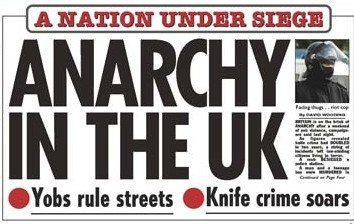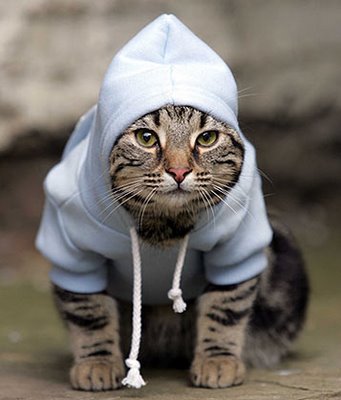Tory hell and failing to understand youth crime.
 Whichever way you look at it, the Conservatives are having hell of a week. Dear old Dave returns from holiday on Monday, finds himself 10 points behind the polls, a Labour lead not seen since prior to the Iraq war, and quite understandably, panics. Cue a quick re-emphasis on one of the few areas where the Tories, much to the chagrin of Labour, had made some headway on: the NHS. Promising a "bare knuckle fight" over hospital closures, the Tories launch a list of what they claim is either going to be shut down, or at least reconstituted in some way. They might have expected that some of the hospital trusts would reply that their claims were nonsense; they didn't expect that one of their own MPs would, who was quickly brought in for some Cameroonian re-education in not making the leader look like an idiot.
Whichever way you look at it, the Conservatives are having hell of a week. Dear old Dave returns from holiday on Monday, finds himself 10 points behind the polls, a Labour lead not seen since prior to the Iraq war, and quite understandably, panics. Cue a quick re-emphasis on one of the few areas where the Tories, much to the chagrin of Labour, had made some headway on: the NHS. Promising a "bare knuckle fight" over hospital closures, the Tories launch a list of what they claim is either going to be shut down, or at least reconstituted in some way. They might have expected that some of the hospital trusts would reply that their claims were nonsense; they didn't expect that one of their own MPs would, who was quickly brought in for some Cameroonian re-education in not making the leader look like an idiot.Clearly thinking they were on to far more of a winner with the tabloid outrage over Chindamo's successful appeal against deportation, Team Cameron comes out and blames the Human Rights Act, demands that it be repealed and that common sense must prevail, hence we must have a "British" Bill or Rights. 24 hours later they have egg on their face again, as it turns out it was an EU directive and not the "hated" act itself which was to blame, but Cameron goes on demanding it must go nevertheless, despite numerous bloggers pointing out the HRA is as much a legacy of the Conservative party and Britain as it is anything to do with Europe, let alone the EU.
Finally then, Cameron makes a speech on the other pressing issue of the week, youth crime, yob culture, anti-social behaviour, whatever you want to call it. It's a little known fact that New Labour invented anti-social behaviour: before Blair came to power and started warbling on about it, little attention had been paid towards it. All that changed as the media latched onto the idea, and soon those unlucky enough to be young, dumb and bored while standing around on street corners became the enemy within. All this remember against a background where the chance of becoming a victim of crime is at the lowest point in a generation, when attacks involving knives peaked in 1995, but where the fear of it rather than the actuality has become ever present. Along with the fear of terrorism, Labour used this as a potent weapon to trim civil liberties down to size, introducing ASBOs, creating 3,000 new criminal offences, and filling the prisons to breaking point.
How then does the Tory party possibly react to some of the most draconian crime and punishment policies seen in decades? First, Cameron attempted to "hug a hoodie", as his speech on showing children more love will forever more be known. While it certainly had some merits, everyone just remembers the soundbite and not what he actually said. This time round it would all be different.
And so it proved. The motto of the day was "common sense", a phrase he used 3 times during the speech. Common sense, unfortunately, is subjective: according to Cameron, it's common sense to hit teenagers where it hurts, which doesn't mean that you punch hormonal youngsters in the region of their developing sexual organs, but that you give courts the power to delay them obtaining a driver's license. His examples for this perhaps weren't the best he could have come up with, as he suggested that a youngster caught buying alcohol twice could have it delayed, which seems like a recipe for embittering and further alienating those caught. In any case, most of the evidence suggests that few 15-year-olds are buying drink, rather getting others to buy it or stealing it from their parents. How many of those most likely to be the source of anti-social behaviour are even in a position to learn to drive and have a vehicle once they turn 17? Learning to drive and getting a car young tends to be a middle-class pursuit, especially due to the costs involved.
Cameron's other main criminal justice proposal was to give magistrates greater power over sentencing, extending the length they can hand down to 12 months, as well as scrapping the early release scheme. Tabloid pleasing gestures, but ones that will put further pressure on the prison system which is already bursting at the seams. The early release scheme has actually done nothing to bring down the population, with it hitting 80,000 again, and scrapping it would only make things worse. Cameron doesn't say whether he's going to build more prisons, but to keep his promise he would have to.
Not that little things like that get in the way of Cameron's rhetoric. He says that violent crime has doubled over the last ten years: the British Crime Survey (PDF) says it has fallen over 41% since 1995, and that 49% of violent incidents reported to the survey do not involve any injury, while the police figures over the year showed no statistical difference. He quotes the Centre for Crime and Justice Study figures on knife crime which the Home Office disputed, and which the centre itself still hasn't put online (nor have they replied to my email) (Update: Richard Garside writes to the Grauniad saying the review is based on the best information the HO has available and that the report will be released next month). He mentions New York as an example of how crime can be tackled, through zero tolerance: when the Sun raised that earlier in the year, I pointed out New York is in fact more dangerous than the whole of Britain combined:
A quick look at the crime statistics, especially the number of murders, shows there were 889 in New York in 2004. By comparison, London had 221. Even taking into account the population difference, with New York having 19 million and London having around 13 million, that's a huge difference. The 889 figure is in fact higher than the number for the whole of Britain in 2004 - the British Crime Survey reporting there were 820.
Much of Cameron's speech rests on familiar arguments, such as cutting down on police red-tape and paperwork and even on the statistic collecting mentioned by Peter Fahy: perhaps because the statistics tell the story that things aren't as bad as either the media or politicians are making out. This isn't to suggest that they're worthless suggestions, as sometimes the most common response does hold a well-known truth, but why should we expect the Tories would be any better than Labour at sorting it out?
Finally, he rounds on the social aspect, bringing up the old new proposals on tax benefits for getting married, designed to soak the middle classes, attacking single mums by saying it's work rather than benefits that's the best path, as if they didn't know, and lastly lauding all those independent organisations that are really making a difference. The Labour response? To accuse them of lurching to the right, which is just about as pot and kettle as you can get, then promoting and extending the ABC behaviour contracts program, which it has to be said is a better suggestion than increasing sentencing.
Unsurprisingly, there's little to no mention in any of this of the actual reasons behind either anti-social behaviour, youth crime, or even gang culture. We've forgotten the causes. Anyone who saw the feature on Newsnight on the "Niets", the 16-24 year-olds not in education, training or work saw the desperation, alienation, humiliation and pessimism that came from their helplessness as a result of their educational failures, family background and endemic poverty that had blighted their lives. They didn't want to be on benefits, they just didn't see any way off of them. Tackling this is just as important as deciding what the latest punishment has to be. Iain Duncan Smith came close to realising this in his report but relied upon the same old solutions which have failed before. It's come to something when it's a man in his 60s, Ming Campbell, who's come the closest to actually getting it.
Labels: David Cameron, scaremongering, Tories, yob culture, youth crime



